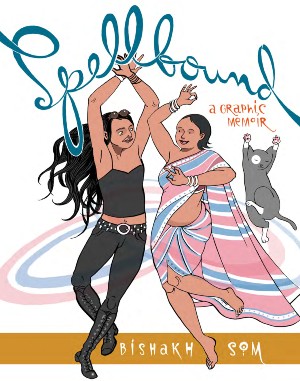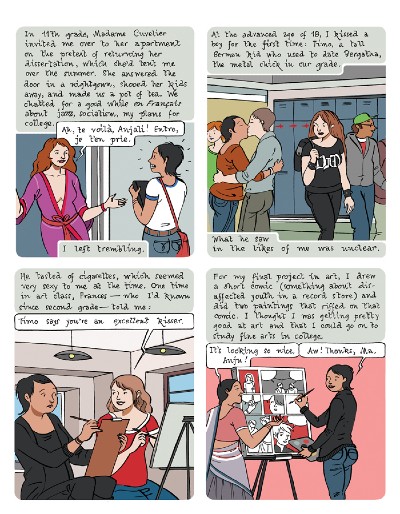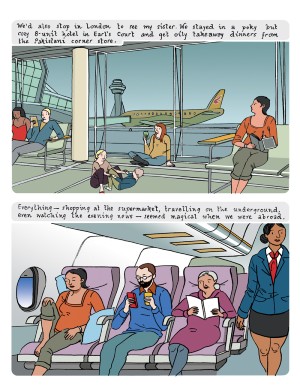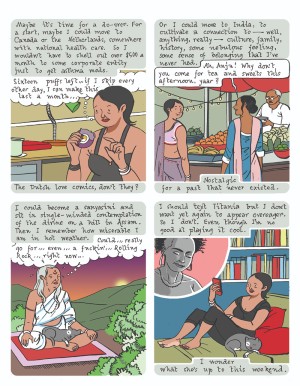 Bishakh Som’s Spellbound: A Graphic Memoir may be an intricately layered piece of storytelling but such is the elegance of its narrative structure that the reader only comes to that realisation at its end. The book comes to us via Street Noise Books whose publisher Liz Frances we interviewed at Broken Frontier last month. Frances said then of this distinctive piece of memoir: “Bishakh is a transgender woman artist, and in her memoir she shares with us a series of autobiographical comics which she wrote over the past few years. At the time she started writing these, Bishakh had not yet identified as trans. But in the comics, she uses a substitute character for herself, Anjali, and that character is a woman. Creating these comics actually provided a catalyst for Bishakh to recognize and embrace her transgender identity.”
Bishakh Som’s Spellbound: A Graphic Memoir may be an intricately layered piece of storytelling but such is the elegance of its narrative structure that the reader only comes to that realisation at its end. The book comes to us via Street Noise Books whose publisher Liz Frances we interviewed at Broken Frontier last month. Frances said then of this distinctive piece of memoir: “Bishakh is a transgender woman artist, and in her memoir she shares with us a series of autobiographical comics which she wrote over the past few years. At the time she started writing these, Bishakh had not yet identified as trans. But in the comics, she uses a substitute character for herself, Anjali, and that character is a woman. Creating these comics actually provided a catalyst for Bishakh to recognize and embrace her transgender identity.”
Using an on-page avatar to filter direct experience through isn’t a rare thing in autobiographical comics. It’s a device I’ve seen used by a number of UK small pressers, for example, to take one step back from the immediacy of events and create a buffer between them and the audience. What makes it so interesting in the pages of Spellbound, however, is that feeling that something different is going on here and that Som’s character Anjali is more a tool for self-discovery than a mechanism for obscuring boundaries.
 Bookended by two explanatory short comic strips acting as Som’s introduction and afterword to the wider realities of the book, Spellbound ostensibly follows her stand-in Anjali who has just taken a year away from her architecture career to work on a graphic novel. What follows is a meta account of the creative process as, on the page, Anjali’s wider life weaves in and out of (and around) her progress on her graphic novel. Flashbacks detail her childhood in Ethiopia with her Indian family, her school days and the eventual loss of her parents, while in the present we observe her everyday life in terms of both pivotal events – exploring her own sexuality and identity – and the minutiae of her everyday routine.
Bookended by two explanatory short comic strips acting as Som’s introduction and afterword to the wider realities of the book, Spellbound ostensibly follows her stand-in Anjali who has just taken a year away from her architecture career to work on a graphic novel. What follows is a meta account of the creative process as, on the page, Anjali’s wider life weaves in and out of (and around) her progress on her graphic novel. Flashbacks detail her childhood in Ethiopia with her Indian family, her school days and the eventual loss of her parents, while in the present we observe her everyday life in terms of both pivotal events – exploring her own sexuality and identity – and the minutiae of her everyday routine.
Spellbound is a reminder of the immersive experience that slice-of-life/autobio comics bring to the reader; that sense of being allowed to lose ourselves between the covers in the company of another person. Som’s art has an accessible clarity which further bolsters that connection between reader and protagonist, and a vibrant but measured use of colour that brings Anjali’s world to life. On occasion, though, her visuals are perhaps not given enough room to breathe, with noticeably text-heavy pages that swamp the art in the early part of the book due to an over-reliance on four-panel grids.
This is, as we say in reviewing parlance, a book that rewards a second reading to reconsider its nuance and meaning, especially in respect of its resonant coda. The term “displaced memoir” used here is a most appropriate one, perfectly encapsulating Som’s discovery of self in a once removed incarnation. As readers we become a part of this self-realisation in a gentle, subtle but no less profound way. In that regard we leave the pages of Spellbound with a sense of being privileged to have been invited into the author’s exploration of her identity. Street Noise Books have been the comics publishing revelation of 2020 and Spellbound: A Graphic Memoir represents yet another distinctive use of the form in communicating personal experience with a deep intimacy and an empathetic eloquence.
Bishakh Som (W/A) • Street Noise Books, $18.99
Review by Andy Oliver

















[…] of Inspiration: A Comics School Anthology, the distinctive intricacies of Bishakh Som’s Spellbound: A Graphic Memoir, and the humorous escapism of Jens K Styve’s Dunce: […]